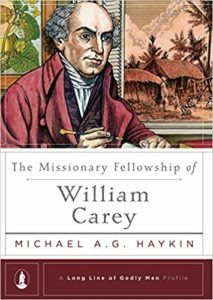Michael A.G. Haykin gives a concise and inspirational account of the life and work of William Carey, English missionary to India and often called “The Father of Modern Missions.” Reformed theology was the solid foundation of Carey’s ministry. Haykin explains:
In his theology, Carey married a deep-seated conviction regarding God’s sovereignty in salvation to an equally profound belief that in converting sinners God uses means.… Without understanding Carey’s consistent delight in Calvinism throughout his life, we cannot understand the man, his motivation, or eventually the shape of his mission. (43–44)
One example of Carey’s firm grasp of the doctrines of grace appears when he writes that one “may well expect to see fire and water agree, as persons with sinful hearts and desires cordially approve of the character of God” (47). Nothing but the sovereign and regenerating work of the Holy Spirit can surmount man’s hostility to God.
This deep, Calvinistic theology did not come from his parents. Born in 1761 to a modest family, Carey’s father served as parish clerk and village schoolmaster in Paulerspury in the county of Northhamptonshire. A child of the Church of England, he grew up with the liturgical rhythms of Psalter readings and Scripture lessons that shape Anglican worship. Although the congregation lacked evangelical piety, Carey recalled that the church “tended to furnish my mind with a general Scripture knowledge” (14).
